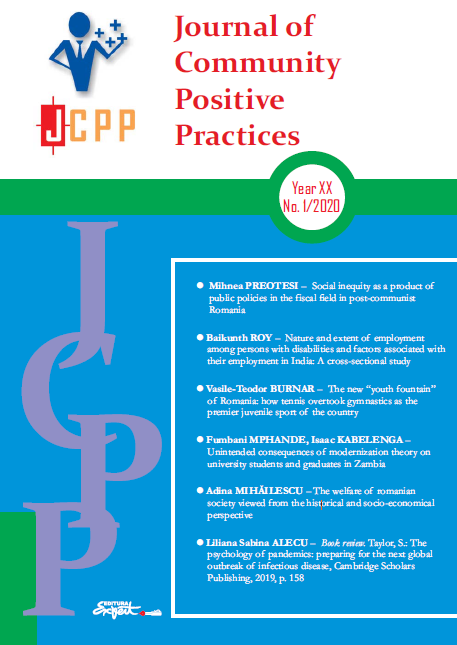SOCIAL INEQUITY AS A PRODUCT OF PUBLIC POLICIES IN THE FISCAL FIELD IN POST-COMMUNIST ROMANIA
SOCIAL INEQUITY AS A PRODUCT OF PUBLIC POLICIES IN THE FISCAL FIELD IN POST-COMMUNIST ROMANIA
Author(s): Mihnea PreotesiSubject(s): Social development
Published by: Asociatia pentru Dezvoltare si promovare socio-economica Catalactica
Keywords: inequity; wage policies; special pensions; privileges;
Summary/Abstract: This analysis is based on the premises that social, economic and fiscal policies can discriminate in a legitim manner certain categories against others only from the perspective of 3 types of reasons: economic criteria; social criteria; meritocratic criteria. From this perspective, any comparative advantage offered to certain groups or individuals, which can not be justified by any of these 3 legitim criteria of discrimination, is actually a privilege, unjustified from the public policies perspective. Even when these advantages follow the logic of differencing based on such legitim criteria, this differencing should be reasonable (to fulfil the condition of social equity as is defined in the theoretic and conceptual frame of this analysis). In Romania, there are significant differences, which do not follow the logic of discrimination according to any of the 3 mentioned criteria, from the perspective of rights, neither from that of obligations. On the other side, even when these are legitim from the above-mentioned perspective, the level of these differences is hard to justify. The differences address categories of people, but are not present on inter-categories level: between the residents connected to centralized heating system (massive subvention regardless the income) and those unconnected (no subvention); the pensions calculated according to different stages of contribution – the entire period, last 5 years, best 5 years, no correlation with the contribution but only with the last month salary. Health insurance is paid only by certain categories, regardless the income, other are excepted also, disregarding the income and some categories pay the contribution to a minimum level, regardless the income. Plus, the level of these differences is unjustified and unjustifiable. The “special” part of the special pensions exceeds in some cases 15 times over the part according to contribution and with the legal possibility unlimited increasing of this non-contributory part for certain categories. The hypothesis I intend to present in this analysis is that this accelerate increasing of the social inequity in the post-communist Romania is the product of establishing and functioning of certain power relations reflected in political decisions that favour one part of the population and disadvantage, correlative, another part of the population. The inequality increased not only based on the meritocratic mechanisms functioning within the economic context of free competition, but mainly based on elite selection mechanisms and social, privileged, un-meritocratic mobility.
Journal: Jurnalul Practicilor Comunitare Pozitive
- Issue Year: XX/2020
- Issue No: 1
- Page Range: 3-25
- Page Count: 23
- Language: English

